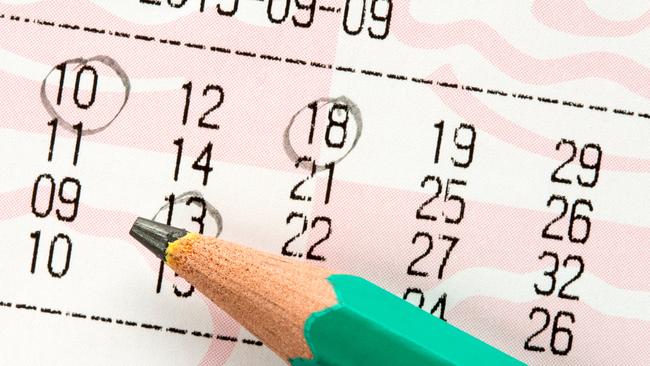Why I don’t want to win the lottery
INSTANT millions are most people’s dream, but I’m convinced the money would make life a nightmare. And there are plenty of winners who say that’s exactly how it turned out, writes Gary Nunn.
Rendezview
Don't miss out on the headlines from Rendezview. Followed categories will be added to My News.
IT’S the stuff dreams are made of, winning the lottery, but I’m convinced it’d be a worse nightmare than most people imagine.
When I tell people I’m not keen on winning that jackpot, they’re incredulous. If I won a huge amount, I’d still want to return to work soon afterwards — but most people refute that too.
This is the largest jackpot week in Australian lottery history. A record $150 million up for grabs in two jackpots — the biggest ever prize pool in the 137-year history of Australian lotteries.
The excitement is tangible, and there are already instant multi-millionaires from last night’s $70 million draw, which had two first division winning tickets. I’ve seen vox pops of Australians wheezing with the thrill of imagining the infinitely superior life they’d have if they won. All the problems they’d solve. The good they’d do. They’ve lost their minds completely.
It’s a grotesque amount. It’d confer unthinkable responsibilities, addictive temptations and ethical dilemmas onto the winner (plus a likely identity crisis). And $80 million feels like too much money for one random person who has done absolutely nothing to truly earn it.
I’ll put to bed right away any notion this comes from a position of financial privilege — just look up rates for a freelance writer these days for evidence!
Granted, those living in poverty would of course benefit from a cash boost. But a huge windfall is very different from paying off debts and having a consistent, living wage. It can be counterintuitively stressful.

Yes, money can solve some problems. As comedian Billy Connolly said: “I’ve been poor, and I’ve been rich. Rich wins!” But he worked for his riches, by honing a skill he’s passionate about.
Lotto dreamers ignore every clichéd adage about money not buying happiness and “more money, more problems”.
I’d go further. I’d say that there’s ample evidence that huge sums of money gifted to people who didn’t work for it can ruin lives.
Look at the Rinehart family. The $4 billion trust fund has torn their family apart, with Gina Rinehart’s two eldest children, John Hancock and Bianca Rinehart, taking their mother to court, claiming she’s denying them their inheritance. Mud has been slung between the mother and her children; family loyalty discarded over money.
If I came into that much money, I’d fear for my own safety, mental health and principles. I fear they’d all be compromised. I’d fear the cumulative effects of gluttony and losing sense of the word “enough”.
It would irrevocably taint the dynamic of friendships. At dinners with friends, I’d be paranoid they would wonder why I wasn’t footing the bill, with the thought “Gary’s the millionaire” running through their heads. Every time I’d hear a friend missing out on a social event because payday is far away, I’d struggle with whether it’s patronising to pay for them, and then possibly resent the expectation to do so.
“But I wouldn’t tell them” is a common riposte. And bingo, your friendship dynamic has already changed. You’re already lying to your closest friends. Leading a double life. The money made you do it.
Pina Compagnone from Lotterywest says most winners keep the news confidential: “The more people they tell, the more questions they have to answer,” she says.

There goes your dream of suddenly becoming a generous person by buying your friends stuff when you win.
If you do tell, who in the family gets hand-outs? How do you decide how much? Do you stop at siblings? Cousins? Struggling aunts or uncles? It’s got bad blood written all over it.
You might stop being grateful for the little things. Getting the final stamp on that loyalty card for a free mocha would no longer delight when you could just buy the coffee shop. Cutting up the Coles Flybuys card would herald the new you.
You’d start to find out who you really are and it might be a disappointing surprise. Generous-spirited socialists can become free-market tax minimises the minute they have enough dosh to hire a financial adviser.
And your principles would be tested like never before. How would you choose where your charitable philanthropy begins and ends when there’s infinite worthiness and endless suffering in the world?
Above all, it’d take away the dignity of work. Knowing you’ve developed a skill and worked for money is priceless. Volunteering often can’t offer the same level of responsibility or skill.
Still unconvinced? Let’s take a look at those lucky lottery winners.
William Post won $US16.2 million ($A21.81 million) in 1988’s Pennsylvania lottery. “I wish it never happened,” Post said. An ex girlfriend successfully sued him for a third of his winnings, and his brother was arrested for hiring a hit man to kill him, to inherit the winnings. He was $US1 million in debt within a year. “I was much happier when I was broke,” he concluded.

Gillian Bayford used her £148 million ($A257.86 million) to pay off her father and brother’s debts and buy her parents an apartment. But the family started asking for more money to maintain their luxury lifestyles. “The money was supposed to make everybody happy. But it’s made them demanding and greedy,” she said. Her family hasn’t spoken to her since May 2015.
Gerald Muswagon won Canada’s $CAD10 million ($A10.30 million) jackpot in 1998. He bought a house that became a nightly “party pad” with endless drugs and alcohol. Muswagon also poured money into a logging business that failed. He was eventually forced to take a job doing heavy lifting on a friend’s farm to make ends meet. Filled with remorse, Muswagon took his own life in his parents’ garage in 2005.
Pentecostal preacher Billy Bob Harrell Jr. won $US31 million ($A41.74 million) in 1997’s Texas jackpot. But he couldn’t say no when people asked for handouts and ended up in debt. Later he divorced and committed suicide. Shortly before his death, he told a financial adviser that “winning the lottery is the worst thing that ever happened to me.”
The dream the lotto tries to sell you is a fallacy. It’s just gambling in a pseudo-acceptable facade. Just like the pokies, the glistening lights blind you to the corrupting evils lurking beneath.
The feeling of the win might just overrule the overrated joy of the actual winnings.
If you played the lotto this week, I wish you all the luck in the world. If you do win, you might well need it.
Gary Nunn is a freelance writer.
